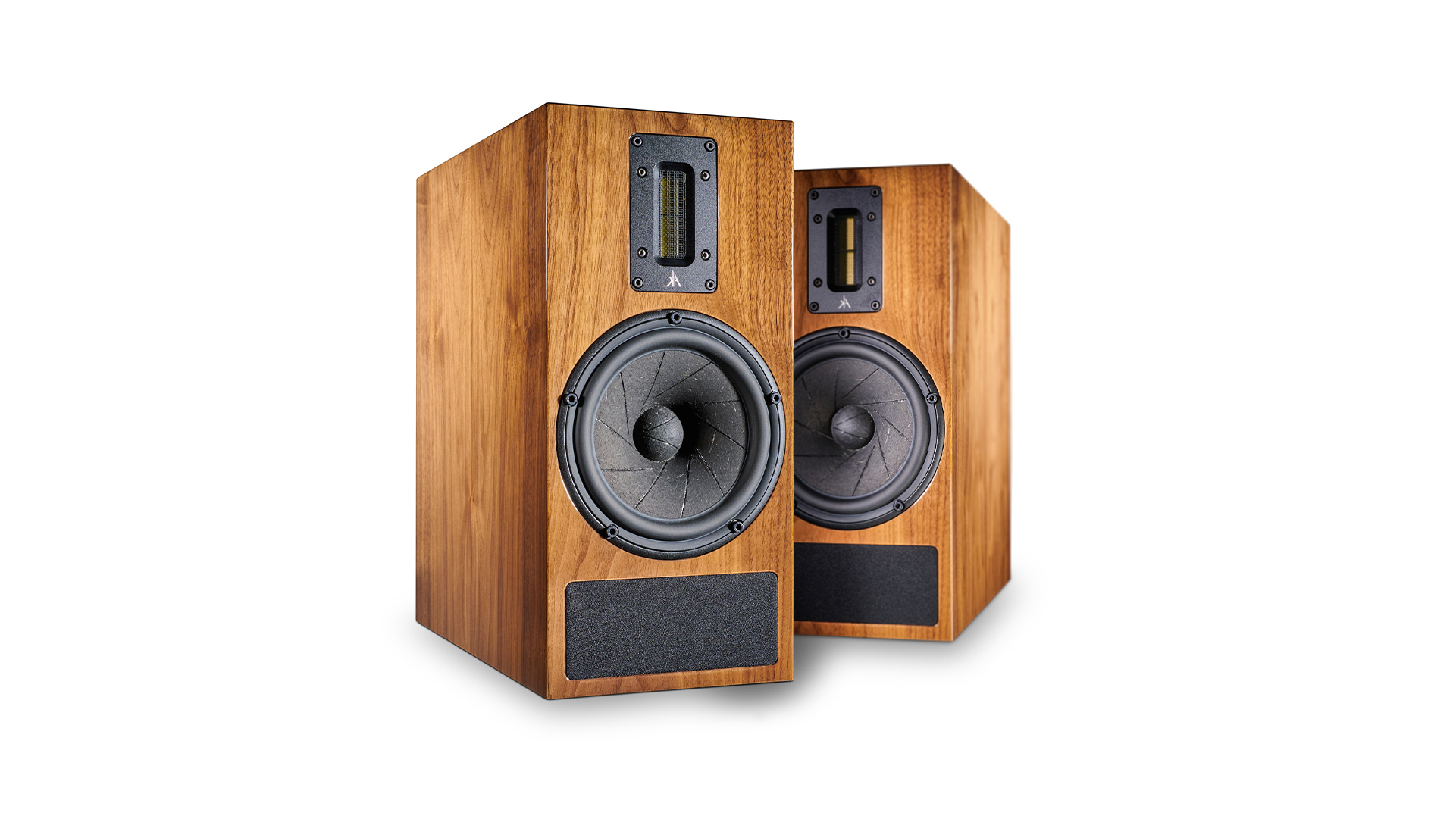What Hi-Fi? Verdict
The Kerr Acoustic K300 Mk3 is one of the most insightful and transparent standmounters we’ve heard at this level
Pros
- +
Impressively transparent and detailed
- +
Expressive dynamics and excellent balance
- +
Pleasing build
Cons
- -
Up against some tough competition
- -
Some rivals sound more impressive (though not necessarily better)
Why you can trust What Hi-Fi?
Anyone lucky enough to be in the market for a pair of high-end standmounters is spoilt for choice. Every major speaker brand has an offering, and to be fair, many of them are terrific. So, given the quality of the competition, why should anyone take a second look at a relative unknown like the Kerr Acoustic K300 Mk3?
Kerr Acoustic is a young brand, founded in mid-2017. At the moment it produces just four models. The K300 Mk3 on test here is the entry point, with a closely related floorstander the next rung up. The brand’s range tops out with a huge three-way floorstander called the K100 Mk2, which features a distinctive 30cm woofer and weighs in at almost 80kg per speaker. The price? Yours for around a cool £30,000 / $40,000 / AU$60,000 depending on the finish.
Build & design
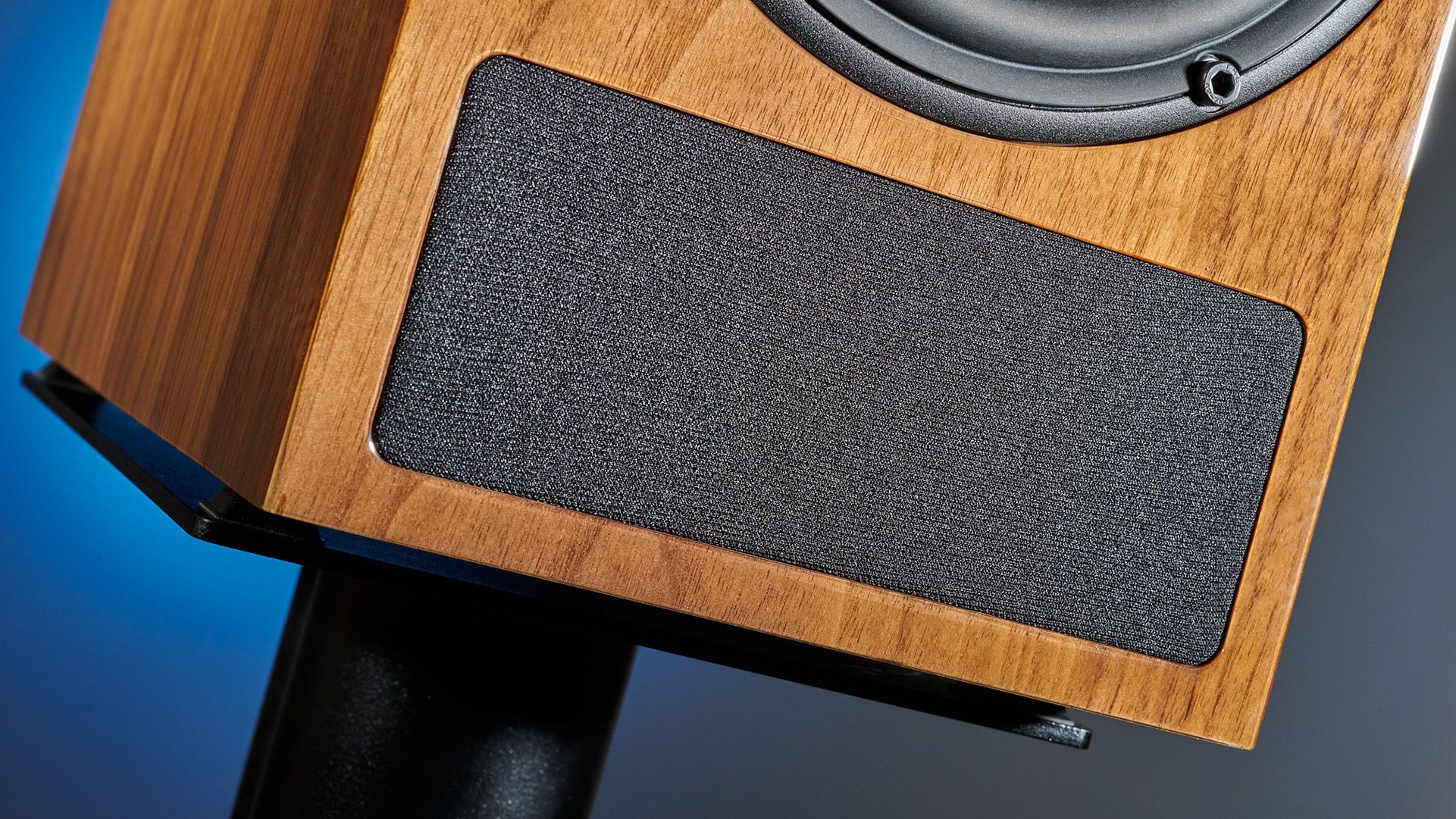
Take a look at the models in the range and you will notice the brand’s admirably consistent approach to speaker design. All models feature transmission line bass loading alongside ribbon tweeters and cabinets made from high-grade Baltic Birch plywood. As such, the entry-level K300 Mk3 we’re reviewing here can rightly claim to offer a proper taste of what the brand offers.
This is a modestly sized speaker, standing 42cm high. These Kerrs are intended for use in medium to small-sized rooms and their slim proportions mean that they are likely to slot into most environments without becoming obtrusive. Visually, they remind us of one of PMC’s more premium standmounter designs but there are enough points of difference, namely the use of a 60mm ribbon and that distinctive sliced 16.5cm mid/bass unit to avoid confusion. The PMC comparison isn’t accidental of course, given that it has championed transmission line designs for decades.
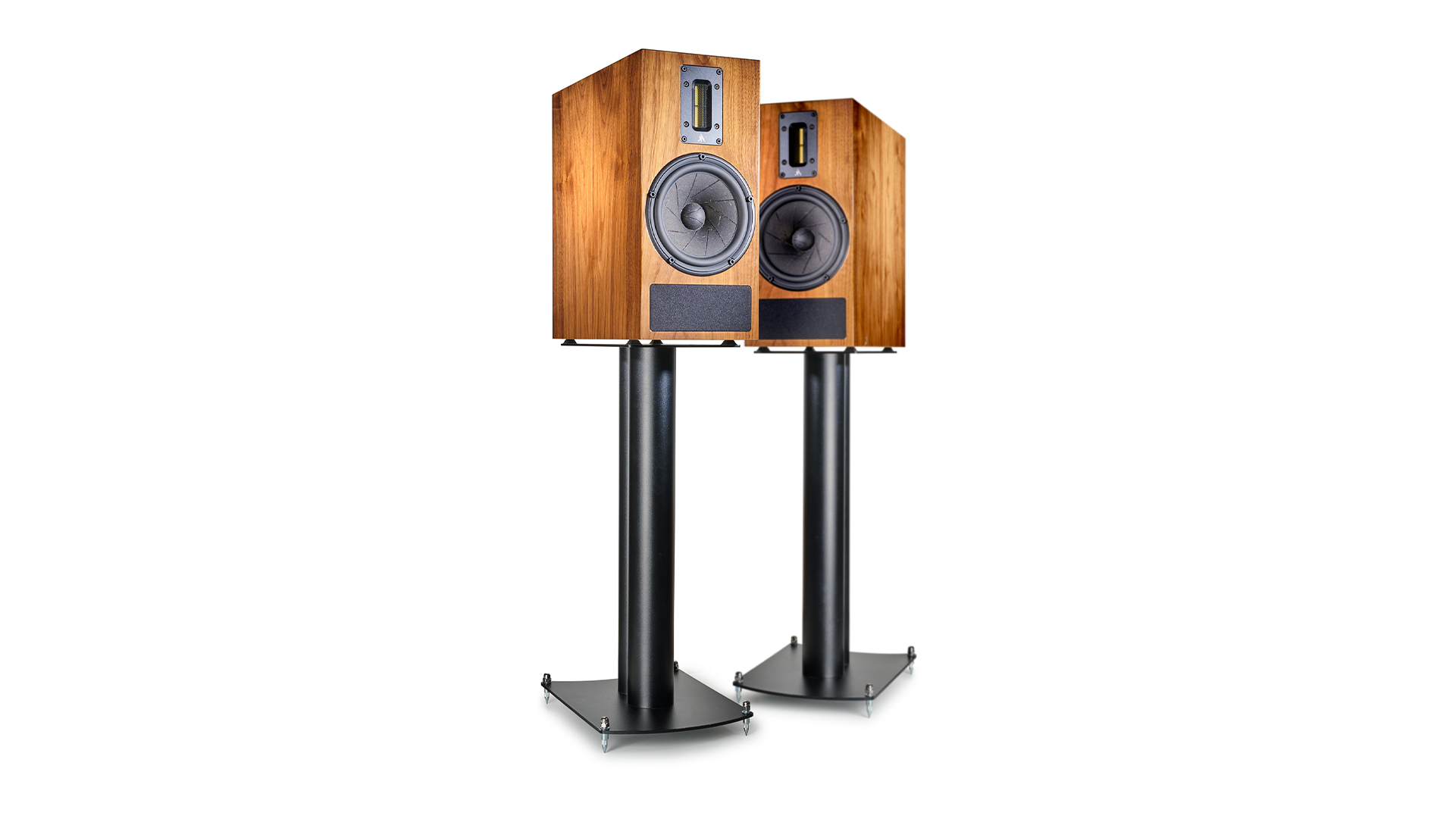
Type Standmounts
Drive units 60mm ribbon tweeter, 16.5cm wood-fibre mid/bass
Ported? Yes, Transmission Line
Bi-wire? No
Impedance 6 ohms
Sensitivity 89dB
Dimensions (hwd) 42 x 19.5 x 39.5cm
Weight 12kg
Finishes x 4 (Oak, Walnut, Rosenut and Black Oak) plus any RAL colour in satin or high gloss
This kind of configuration has always been rare due to the complexities of designing and building a transmission line cabinet and the added costs of doing so. In such a speaker the rearward sound from the mid/bass drive unit travels down a folded, damped path inside the enclosure. The damping absorbs all but the lowest frequencies and these exit through the rectangular mouth at the base of the front baffle, augmenting the forward output of the drive unit. The exact length of the transmission line is critical, as is the damping that absorbs the higher frequencies of the mid/bass driver’s rearward output. But get it right, and the results can be impressive in terms of the speaker’s bass output and low-frequency distortion levels. An added advantage is that the folded transmission line also braces the cabinet sides, making them even more rigid.
The K300 Mk3’s cabinet is made of Baltic Birch plywood. The front baffle is 24mm thick while the rest of the cabinet reverts to 18mm. This material has been chosen for its structural and acoustic properties, helping to deliver the rigid yet well-damped enclosure Kerr Acoustic wanted. This type of plywood may be more expensive and less easy to machine than the MDF used in most rivals, but the company thinks the advantages outweigh the negatives. Build quality is as good as we would expect for the money, with crisp and neat edges and an impressive attention to detail on things like the the quality of finish and chunky, single-wire binding posts.
There are plenty of finish options from four real wood veneers (oak, walnut, rosenut and dark oak) in standard or high gloss variants to custom paint finishes from the RAL catalogue in either satin or high gloss. The price premiums for any of the satin or high-gloss options range from around 4 per cent to 13 per cent extra on top of the base price we’ve quoted.
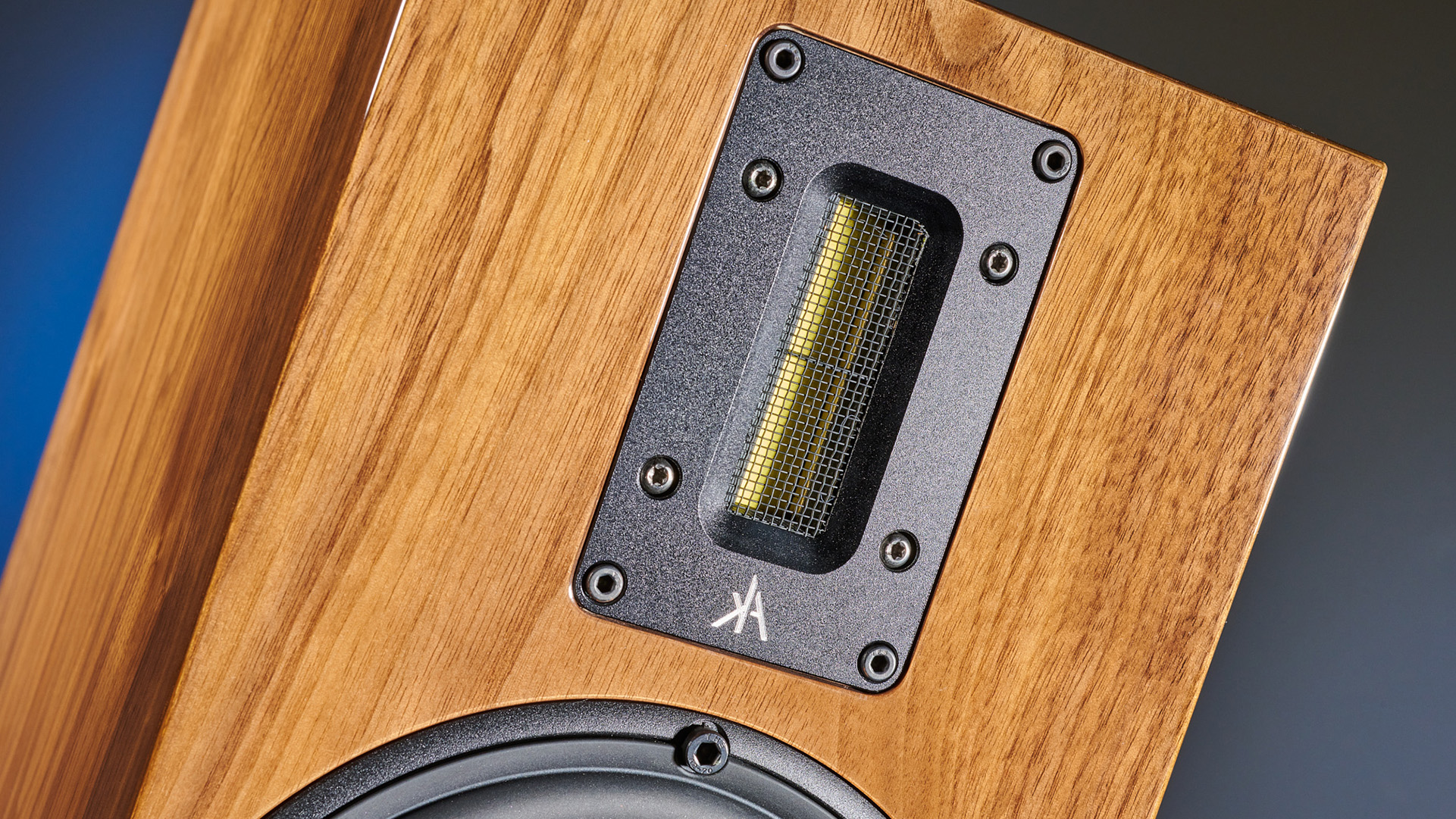
True ribbon tweeters are something of a rarity. We’re more used to seeing the AMT (Air Motion Transformer) folded type instead, but Kerr’s engineers wanted to prioritise low mass for better transient behaviour and detail resolution. The 60mm long diaphragm of the modified Fountek-made unit fitted to the K300 Mk3 weighs just 0.027g where a typical soft dome comes in at around 0.5g and an AMT roughly 0.17g.
Here it is partnered with the well-known 16.5cm Scanspeak Revelator 18W/4531 mid/bass unit. This drive unit uses a wood fibre cone that is sliced and damped to break up resonances and has a hefty motor system to deliver strong dynamics and low distortion. The two drivers are knitted together with a relatively simple 2nd order crossover that is packed with high-quality, hand-wound air core inductors, polypropylene capacitors and carbon film resistors.
Compatibility
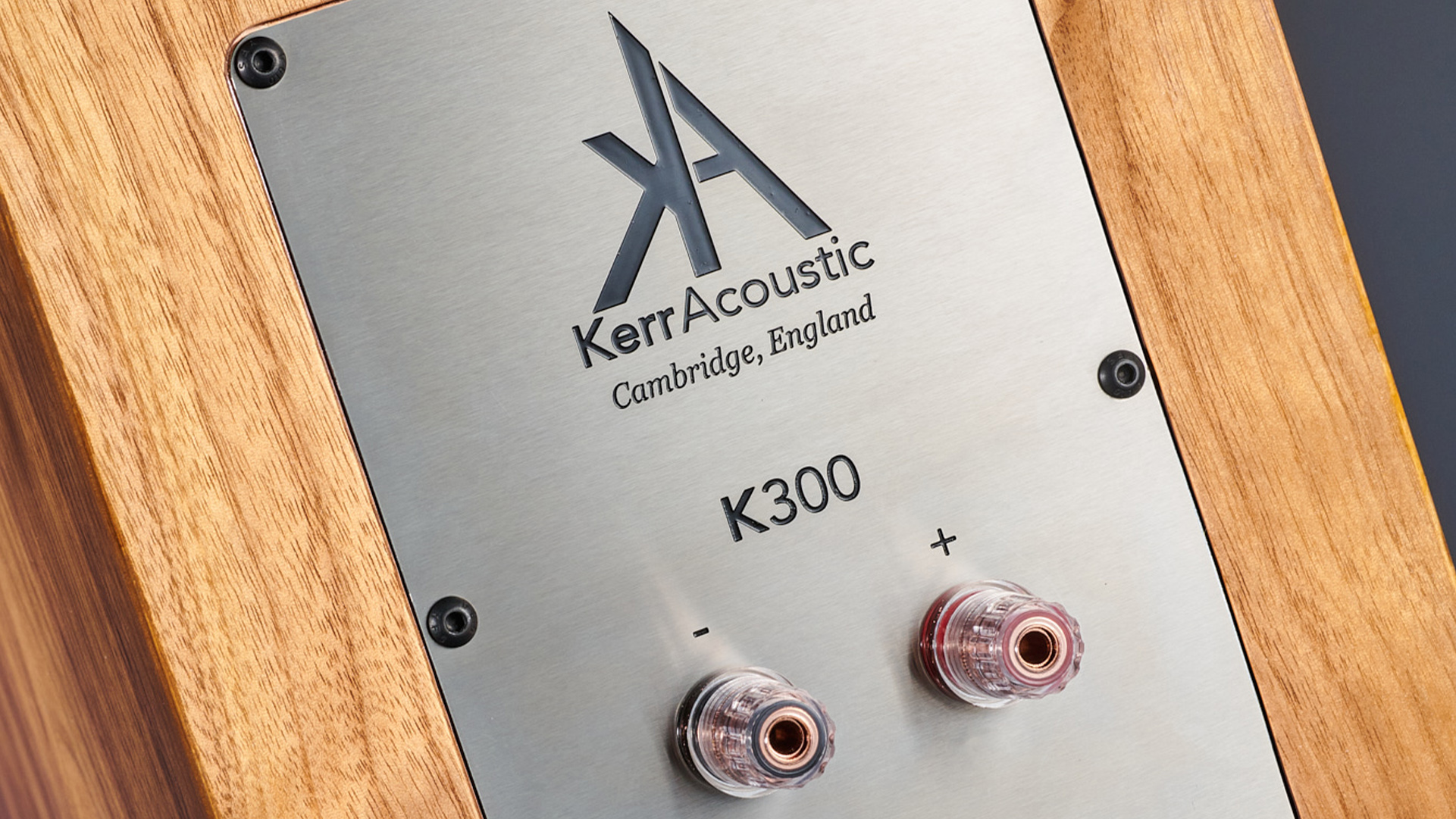
The priority was not only to achieve a flat frequency response but also to make sure the speaker’s time domain behaviour was good too. At the same time, there was a determination to ensure that the speaker’s impedance curve remained gentle. Combining these often conflicting requirements is no easy task, but the K300 Mk3 has a claimed sensitivity of 89dB/W/m and a nominal impedance of 6 ohms. Having seen the speaker's impedance curve we can verify that they shouldn’t be hard to drive for any price-compatible amplifier, bar some very low output valve-driven exotic designs.
The performance of any standmount speaker is heavily dependent on the quality of its support, so we’re always happy when a manufacturer makes the effort to produce a dedicated stand. The K300 Mk3’s metal stands are decently solid and well-damped when filled. At £595 / $795 / AU$1225 they come in a little lower priced than the dedicated stands designed to partner with most competitor speakers but still do a good job.
Any speaker at this level positively demands a high-quality signal feed. We use our usual reference set-up of Naim ND555/555 PS DR music streamer and Technics SL-1000R/Kiseki Purpleheart MC record player feeding Burmester’s 088/911 Mk III pre/power amplifier. We also have Naim’s SuperNait 3 integrated on hand to see how the Kerrs react to more modest amplification.
Sound
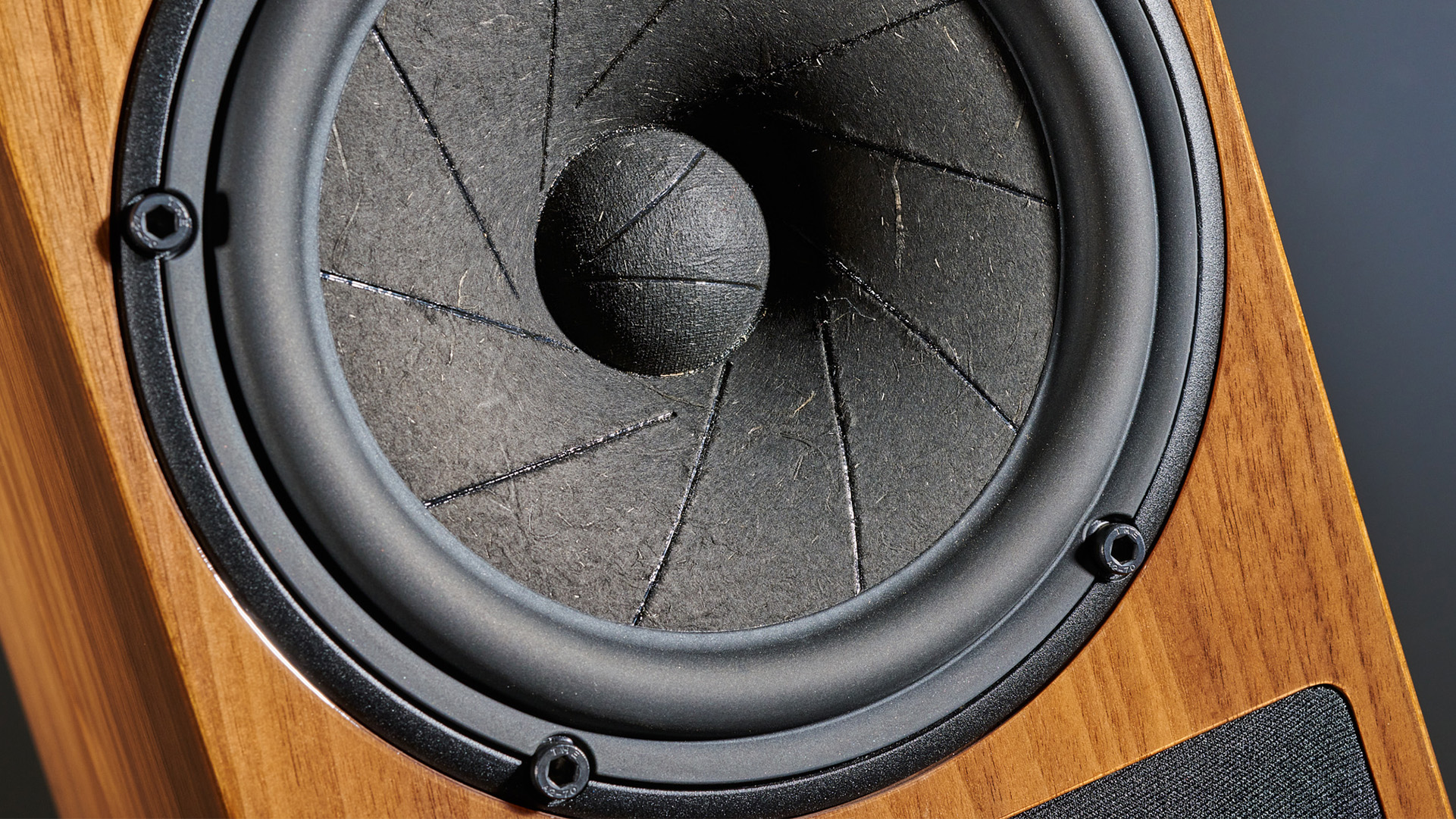
It turns out that there is no need for concern. These are impressively transparent speakers that simply reflect the quality of the signal that is fed to them. We spent a good few hours going through a string of recordings from Kind Of Blue by Miles Davis to Prince’s Controversy with the likes of Nine Inch Nails (With Teeth) and Al Green (...Is Love) in between, deeply impressed by the way these speakers reveal so much about the various productions and recordings in general. These standmounts are detail retrievers of the highest order, but present all that information in such a cohesive and natural way that our attention is held by the musical experience rather than the mechanics of the recording.
For this to happen the K300’s tonal character has to be even and balanced, and it is. It isn’t uncommon for premium standmounters to deliver unusually large amounts of bass for their size, as it is one way for manufacturers to justify charging so much for a compact box. But there are obvious negatives to this approach, mainly that the lows can sound unwieldy and lacking in subtlety.
The Kerrs don’t do that, preferring to deliver slightly lean but still proportionate and articulate lows instead. Don’t get us wrong, feed them the likes of Hans Zimmer's Interstellar OST and they will still dig deep and with authority, but there is never so much bass that we wonder if we’ve connected a subwoofer accidentally. The payoff is quality. Those low frequencies are precisely defined and beautifully textured, and perhaps most importantly of all, blend seamlessly into the similarly impressive midrange.
This Hans Zimmer soundtrack highlights the K300 Mk3’s excellent dynamic reach and their finesse with low-level instrumental strands. They readily reveal compression in a recording and are an open window if you want to analyse the recording quality of the music you are listening to. It is important to note that while they readily reveal the character of a recording, these Kerrs don’t go out of their way to artificially highlight flaws. They remain surprisingly listenable unless the recording or partnering system is especially poor.
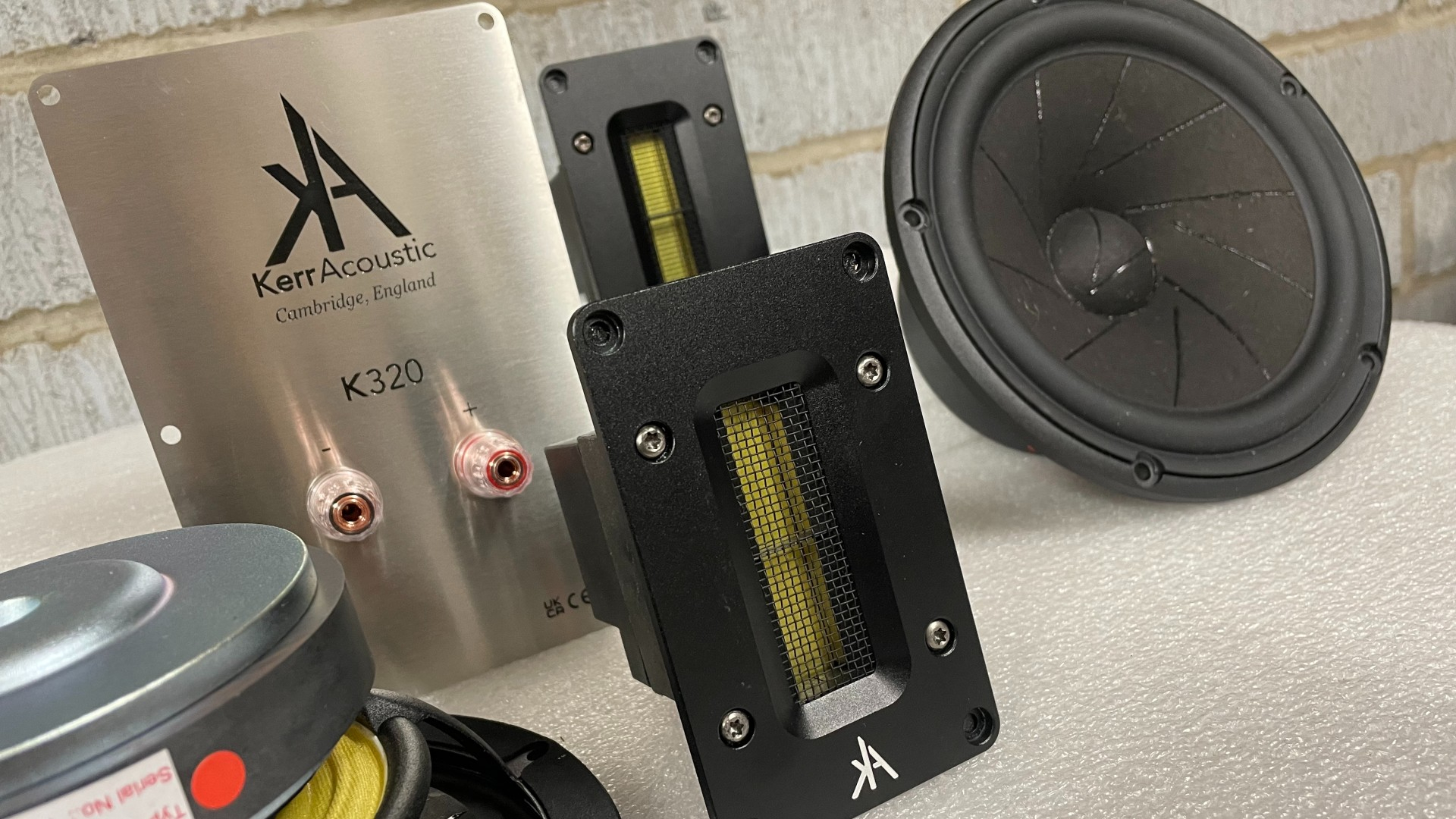
These standmounters sound composed when pushed hard and retain an admirable level of control when the music becomes demanding. Importantly, they work well at low volume levels too, managing to sound interesting and engaging even when played at a whisper. Most rivals lose much of their energy when used similarly. This is an important attribute for us, as it isn’t always possible to play at medium to high levels late at night or if you want to avoid bothering other family members or neighbours.
Smaller speakers tend to stereo image well, and these Kerrs are no different. They deliver a wide and deep soundstage and populate it with crisply focused sounds. Instruments are locked in position and nicely layered when it comes to rendering the depth aspect. Pleasingly, the stereo imaging remains stable when the music becomes demanding.
Verdict
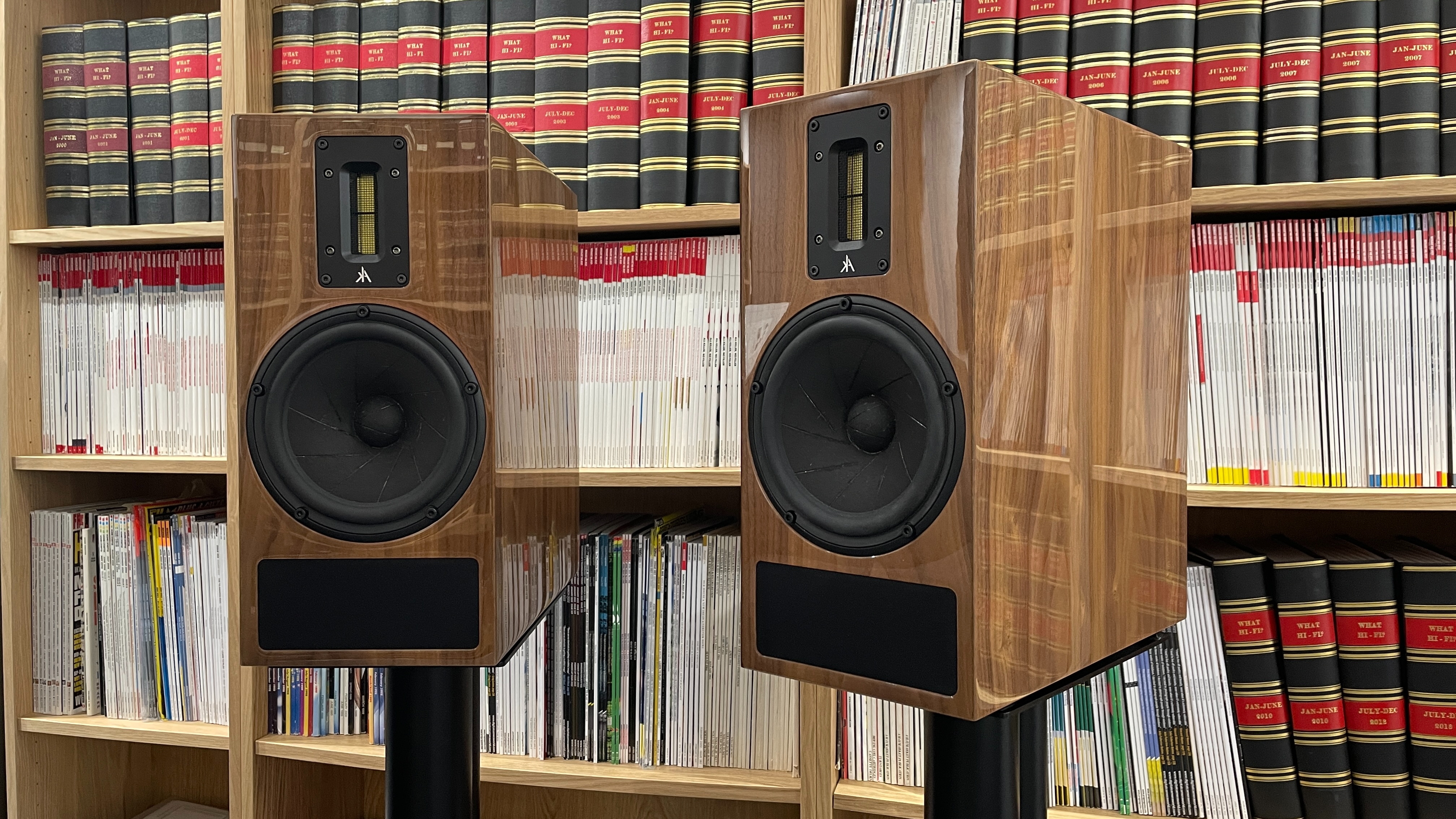
We have really taken to these unassuming speakers. So, to return to our original question. Why should anyone looking at this end of the market consider these Kerr Acoustic speakers above the much more established competition? In our view, they excel in transparency and balance when used in a small to medium-sized room. If you really want to hear what’s on the recording, these are about as good as it gets at this level in revealing that.
SCORES
- Sound 5
- Build 5
- Compatibility 5
MORE:
Read our review of the KEF Reference 1 Meta
Also consider the Bowers & Wilkins 805 D4
Read our Fyne Audio F1.8 review
What Hi-Fi?, founded in 1976, is the world's leading independent guide to buying and owning hi-fi and home entertainment products. Our comprehensive tests help you buy the very best for your money, with our advice sections giving you step-by-step information on how to get even more from your music and movies. Everything is tested by our dedicated team of in-house reviewers in our custom-built test rooms in London, Reading and Bath. Our coveted five-star rating and Awards are recognised all over the world as the ultimate seal of approval, so you can buy with absolute confidence.
-
podknocker 'Some rivals sound more impressive (though not necessarily better)'Reply
This is the same thing, surely?
Some right nonsense on this site and forum these days. -
Travis Daki Reply
Indeed. :Dpodknocker said:'Some rivals sound more impressive (though not necessarily better)'
This is the same thing, surely?
Some right nonsense on this site and forum these days. -
nopiano I’m a bit puzzled by the Mk3 designation, when the company has only been around for six years. Have they really revamped it twice in that short time?Reply
I love the proper fastenings being on show. Much more reassuring than the drivers hidden by metal trim rings!
